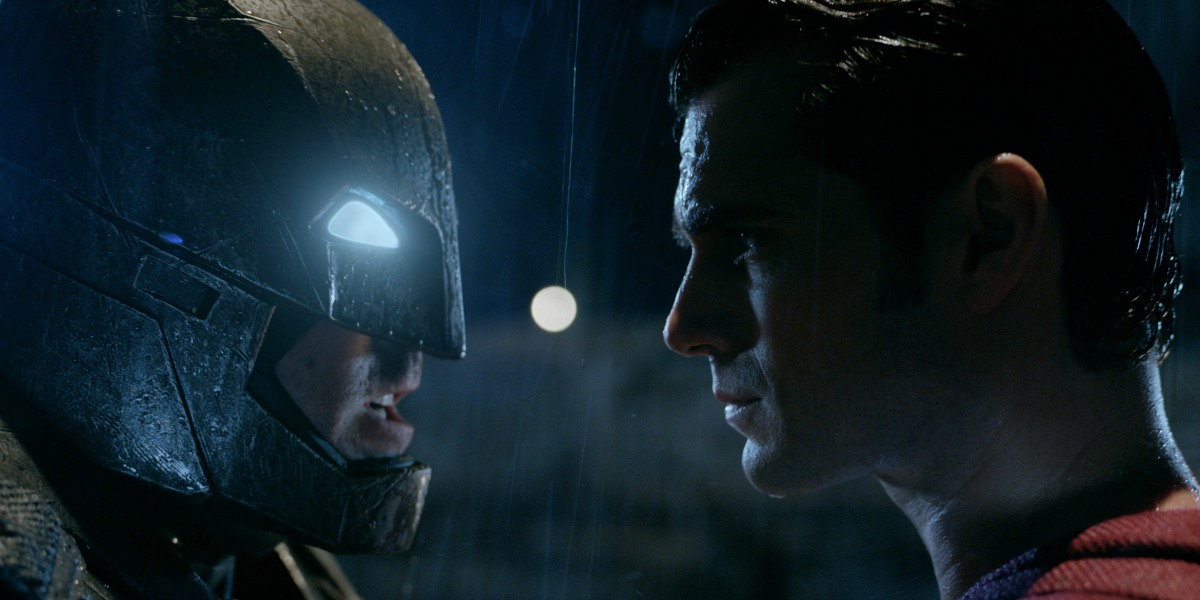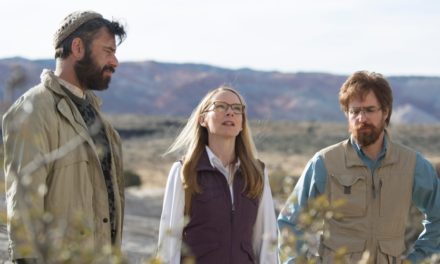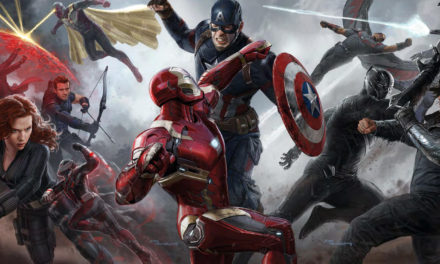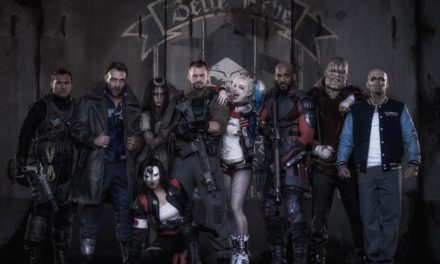Star Rating: 2.5 out of 5
*I found it difficult to review this movie without mentioning specifics, so with that being said there are definitely some spoilers in this*
As the lights of the theater darkened and the Warner Bros logo flashes across the screen in front of me, I am introduced to Ben Affleck’s Bruce Wayne for the first time, and then I am beat over the head with Batman’s origin story for the 12th time and I find myself asking, “Why?” This question would be my guiding light throughout the rest of Batman v Superman: Dawn of Justice.
After recapping the death of the Waynes and watching young Bruce Wayne lifted up out of the bat cave by bats, Batman v Superman throws us back into the destruction of Metropolis at the end of Man of Steel, this time following Bruce Wayne on the ground level as destruction rains from above. Why is Bruce Wayne in Metropolis? It’s simple: because Bruce needed a reason to hate Superman. As much as I liked the idea going into the movie that Bruce had a vendetta against Superman because of the careless destruction he brought to Metropolis, watching it executed on screen made me roll my eyes. It is never explained why Bruce is in Metropolis to begin with. Why does Bruce run toward the destruction and why does the movie not give us a reason? I understand that the Wayne Financial Building is somewhere in the city, but even this doesn’t make sense when we learn later in the movie that Gotham and Metropolis sit right across from each other. With all of the destruction happening at the end of Man of Steel any building in Gotham could have easily been destroyed. It might have made more sense if a Wayne building in Gotham had been hit by General Zod or Superman.
After the short Man of Steel ending recap, we are thrown right into the main story. Bruce Wayne/Batman is investigating someone or something called the White Portuguese. This somehow involves him fighting a lot of pedophiles and human traffickers as Batman and betting in underground fight clubs as Bruce Wayne. All of this leads him to a secret project that Lex Luthor owns that involves Kryptonite, whom he is bringing into the country. Clark Kent does his best (I mean worst) job as a journalist to try and investigate the Batman. The extent of his investigation seems to be asking Bruce Wayne three or four questions at a party thrown by Lex Luthor. Meanwhile, Superman is busy saving people from natural disasters and fires and dealing with the government deciding whether he is a threat or a hero after he saves Lois in the middle east. Lex Luthor spends his time making backroom deals to gain access to General Zod’s body and the Kryptonian ship remains. It is in the middle part of the movie that I have the least amount of complaints about. Diana/Wonder Woman’s introduction seemed natural in the Lex Luthor party scene. The relationship between Bruce and Alfred also felt natural. Following the story from Bruce’s point of view made sense because not only do we introduce a new character to the DC movie universe, but we also get to unravel the mystery of everything that is happening at the same time that Bruce does. In fact, the parts of the story that didn’t make sense all involved Superman. It’s never really explained why the U.S. government feels the need to declare Superman a hero or a threat. In fact, all of the politics in the film fail and get pushed to the background with everything else that is happening. Which is really disappointing because I like the idea of people struggling and arguing over whether or not Superman should be considered a threat or a hero. Its the one thing that makes his character potentially interesting, especially in a movie universe that is supposed to be dark and grim and somewhere more realistic. My other major complaint with the middle of the movie is that all of Lex Luthor’s rants about god’s and demon’s feels really heavy handed. Jesse Eisenberg’s performance as an eccentric Lex Luthor was perfect, until he started making lots of contrived speeches to every character about how Superman isn’t a god but a demon in disguise. I get it, Lex Luthor hates Superman to an almost obsessive level, but movie Lex Luthor almost comes across as a Trump following backwoods bible church bigot.
In the end, it’s revealed that everything we just spent the last hour and a half watching was manipulated by Lex Luthor and we finally get to see Batman and Superman fight. The fight itself was pretty cool and well worth the wait. I’m still not sure if I liked the reason for them to stop fighting or not. On one hand it was a neat connection between the two characters that I had not thought of before, on the other hand it felt like a silly way to stop the fight (apart from Lois running in and yelling, “STOP!”). It might have been a smoother transition had Lex Luthor just released Doomsday and let the two settle their differenced by battling a real threat. At the end it is revealed that Lex Luthor orchestrated all of the previous events in the movie with the intention of Batman killing Superman. This reveal comes in two scenes, which I think makes the reveal fall flat. The first time we realize Lex Luthor is behind everything he sends Superman off to kill Batman to save Martha Kent and we are left wondering, “why does Lex want Batman dead?” It’s later revealed that Lex intended for Batman to kill Superman in the fight.
The rest of the movie had some eye rolling, face-palming moments like when Lois tried to help Batman, Superman, and Wonder Woman by trying to get the kryptonite spear, or when Martha Kent gives Lois the ring Clark intended to give her (seriously, why was this at all necessary?). The final battle was great since we got to see Batman and Superman and Wonder Woman all fight side by side.
The casting in this movie was perfect. I remember hearing that Jesse Eisenberg was cast as Lex Luthor and thinking it was the worst decision in the world, but I was pleasantly surprised by it. I wish Zach Snyder would have kept the deleted scene, Communion, in so that Lex didn’t seem so uncharacteristically fanatical at the end. Ben Affleck has earned his spot as my second favorite Bruce Wayne/Batman. I even considered wanting to see Matt Damon show up as Robin or Nightwing in one of the future DC movies. Jeremy Irons as Alfred is very comparable to Michael Caine and I loved that. He felt like a friend, a sidekick, and a pseudo-father figure all at the same time without being too overbearing.
Some of my biggest frustrations with the movie involve scenes that are clearly designed to set up future movies in the franchise. I really want to know why Zach Snyder and the writers felt the need to make Bruce Wayne some kind of psychic in his dreams. Why couldn’t Bruce Wayne actually see the Flash instead of giving the illusion that he dreamt it? I understand that every director’s interpretation of Batman is going to vary, but I almost feel like Zach Snyder and the writers including the beginning Bruce floating on bats, and the bat monster in the Wayne mausoleum dreams were only included to “make sense” of the later Flash and Knightmare sequences. The movie makes it abundantly clear why Bruce does not like Superman and I feel like it would have been better to instead make the Knightmare sequence a hypothetical situation that Bruce shares with Alfred and instead of including the parademons or any signs of Apokoplips or Darkseid, only deal with the potential of Superman rising up to be a word-dominant tyrant (hey, almost like that Injustice game). I kind of felt like the email correspondence between Bruce and Diana completely interrupted the ending of the movie (in a bad way). Since Bruce appeared to be the main or central character to the movie, it would have made sense for him to open up all of the files and then save the photograph for later in the movie when Diana receives the email. This would have kept the plot moving, and still saved a small pseudo-reveal for the end that wouldn’t have completely stopped the main plot.
Overall, I thought the movie was better than the 29% rating it now has on Rotten Tomatoes, but it was not great. Zach Snyder has definitely perfected visually bringing comic books to the big screen, but only time will tell if his next movie in the DC franchise will be less divisive than his first two. He listened to the many complaints about Man of Steel (perhaps too well); lets see if he can continue to grow from here. I am excited to see the director’s cut in a few months to see whether that improves the story (like the Communion scene) or further detracts from it.





